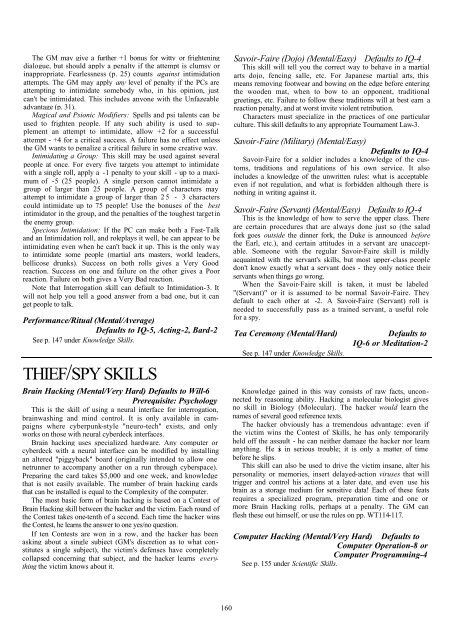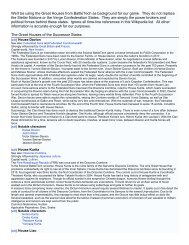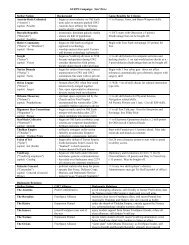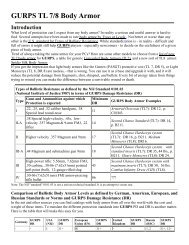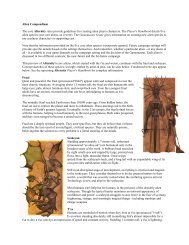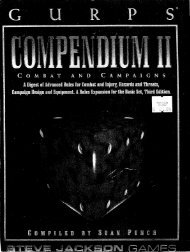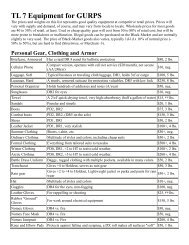GURPS - Compendium 1..
GURPS - Compendium 1..
GURPS - Compendium 1..
Create successful ePaper yourself
Turn your PDF publications into a flip-book with our unique Google optimized e-Paper software.
The GM may give a further +1 bonus for witty or frightening<br />
dialogue, but should apply a penalty if the attempt is clumsy or<br />
inappropriate. Fearlessness (p. 25) counts against intimidation<br />
attempts. The GM may apply any level of penalty if the PCs are<br />
attempting to intimidate somebody who, in his opinion, just<br />
can't be intimidated. This includes anyone with the Unfazeable<br />
advantage (p. 31).<br />
Magical and Psionic Modifiers: Spells and psi talents can be<br />
used to frighten people. If any such ability is used to supplement<br />
an attempt to intimidate, allow +2 for a successful<br />
attempt - +4 for a critical success. A failure has no effect unless<br />
the GM wants to penalize a critical failure in some creative way.<br />
Intimidating a Group: This skill may be used against several<br />
people at once. For every five targets you attempt to intimidate<br />
with a single roll, apply a -1 penalty to your skill - up to a maximum<br />
of -5 (25 people). A single person cannot intimidate a<br />
group of larger than 25 people. A group of characters may<br />
attempt to intimidate a group of larger than 25 - 3 characters<br />
could intimidate up to 75 people! Use the bonuses of the best<br />
intimidator in the group, and the penalties of the toughest target in<br />
the enemy group.<br />
Specious Intimidation: If the PC can make both a Fast-Talk<br />
and an Intimidation roll, and roleplays it well, he can appear to be<br />
intimidating even when he can't back it up. This is the only way<br />
to intimidate some people (martial arts masters, world leaders,<br />
bellicose drunks). Success on both rolls gives a Very Good<br />
reaction. Success on one and failure on the other gives a Poor<br />
reaction. Failure on both gives a Very Bad reaction.<br />
Note that Interrogation skill can default to Intimidation-3. It<br />
will not help you tell a good answer from a bad one, but it can<br />
get people to talk.<br />
Performance/Ritual (Mental/Average)<br />
Defaults to IQ-5, Acting-2, Bard-2<br />
See p. 147 under Knowledge Skills.<br />
THIEF/SPY SKILLS<br />
Brain Hacking (Mental/Very Hard) Defaults to Will-6<br />
Prerequisite: Psychology<br />
This is the skill of using a neural interface for interrogation,<br />
brainwashing and mind control. It is only available in campaigns<br />
where cyberpunk-style "neuro-tech" exists, and only<br />
works on those with neural cyberdeck interfaces.<br />
Brain hacking uses specialized hardware. Any computer or<br />
cyberdeck with a neural interface can be modified by installing<br />
an altered "piggyback" board (originally intended to allow one<br />
netrunner to accompany another on a run through cyberspace).<br />
Preparing the card takes $5,000 and one week, and knowledge<br />
that is not easily available. The number of brain hacking cards<br />
that can be installed is equal to the Complexity of the computer.<br />
The most basic form of brain hacking is based on a Contest of<br />
Brain Hacking skill between the hacker and the victim. Each round of<br />
the Contest takes one-tenth of a second. Each time the hacker wins<br />
the Contest, he learns the answer to one yes/no question.<br />
If ten Contests are won in a row, and the hacker has been<br />
asking about a single subject (GM's discretion as to what constitutes<br />
a single subject), the victim's defenses have completely<br />
collapsed concerning that subject, and the hacker learns everything<br />
the victim knows about it.<br />
Savoir-Faire (Dojo) (Mental/Easy) Defaults to IQ-4<br />
This skill will tell you the correct way to behave in a martial<br />
arts dojo, fencing salle, etc. For Japanese martial arts, this<br />
means removing footwear and bowing on the edge before entering<br />
the wooden mat, when to bow to an opponent, traditional<br />
greetings, etc. Failure to follow these traditions will at best earn a<br />
reaction penalty, and at worst invite violent retribution.<br />
Characters must specialize in the practices of one particular<br />
culture. This skill defaults to any appropriate Tournament Law-3.<br />
Savoir-Faire (Military) (Mental/Easy)<br />
Defaults to IQ-4<br />
Savoir-Faire for a soldier includes a knowledge of the customs,<br />
traditions and regulations of his own service. It also<br />
includes a knowledge of the unwritten rules: what is acceptable<br />
even if not regulation, and what is forbidden although there is<br />
nothing in writing against it.<br />
Savoir-Faire (Servant) (Mental/Easy) Defaults to IQ-4<br />
This is the knowledge of how to serve the upper class. There<br />
are certain procedures that are always done just so (the salad<br />
fork goes outside the dinner fork, the Duke is announced before<br />
the Earl, etc.), and certain attitudes in a servant are unacceptable.<br />
Someone with the regular Savoir-Faire skill is mildly<br />
acquainted with the servant's skills, but most upper-class people<br />
don't know exactly what a servant does - they only notice their<br />
servants when things go wrong.<br />
When the Savoir-Faire skill is taken, it must be labeled<br />
"(Servant)" or it is assumed to be normal Savoir-Faire. They<br />
default to each other at -2. A Savoir-Faire (Servant) roll is<br />
needed to successfully pass as a trained servant, a useful role<br />
for a spy.<br />
Tea Ceremony (Mental/Hard)<br />
See p. 147 under Knowledge Skills.<br />
Defaults to<br />
IQ-6 or Meditation-2<br />
Knowledge gained in this way consists of raw facts, unconnected<br />
by reasoning ability. Hacking a molecular biologist gives<br />
no skill in Biology (Molecular). The hacker would learn the<br />
names of several good reference texts.<br />
The hacker obviously has a tremendous advantage: even if<br />
the victim wins the Contest of Skills, he has only temporarily<br />
held off the assault - he can neither damage the hacker nor learn<br />
anything. He is in serious trouble; it is only a matter of time<br />
before he slips.<br />
This skill can also be used to drive the victim insane, alter his<br />
personality or memories, insert delayed-action viruses that will<br />
trigger and control his actions at a later date, and even use his<br />
brain as a storage medium for sensitive data! Each of these feats<br />
requires a specialized program, preparation time and one or<br />
more Brain Hacking rolls, perhaps at a penalty. The GM can<br />
flesh these out himself, or use the rules on pp. WT114-117.<br />
Computer Hacking (Mental/Very Hard) Defaults to<br />
Computer Operation-8 or<br />
Computer Programming-4<br />
See p. 155 under Scientific Skills.<br />
160


